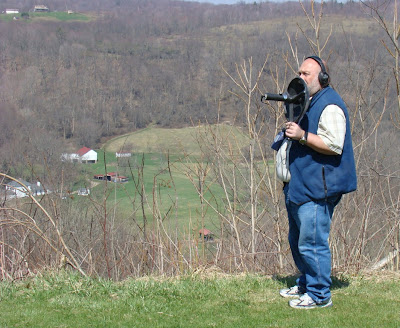
Ravens can easily be mistaken for a American Crow, but for the wedged shape tail, "big honking" bill and somewhat larger size in general. The American Crows are common in Ohio. The Common Ravens... not so.
It is all about habitat, and the high walls the ravens love to nest on are more commonly found in Pennsylvania and the Virginias. It is not a regular feature of Ohio's geology, unless... the area has been mined for coal. Strip mining laid bare portions of the Ohio landscape and older sites were never "restored" to current Government standards. So, it is those high walls at Fernwood that lured in our first ravens.
We conducted a pretty thorough survey, including the local landfill. Greg Miller brought along a super-sensitive listening devise, but nada. No "Rawk" of the raven was heard.
...
In the immediate area of the Common Raven's uncommon nest was an on-going logging operation. We probably shouldn't be surprised that the ravens felt threatened and vacated the area, especially since it happened during their nesting season.
...
The analogy that best describes this type of forest fragmentation can be found in David Quammen' s Song of the Dodo. You'll want to read the book, but here is the quick version:
Start with an expensive oriental rug. Now, take a carpet knife and cut that rug into 16 equal squares. It should be worth the same amount, right? Wrong. You have a dismembered whole, which no longer retains the same value. Each square has ragged edges prone to unraveling, or in forest terms, invasive species eating away at the edges of our natural areas.
...
Every gas line right-of -way, every roadway, every timber operation fragments the whole and reduces biodiversity a forest or natural area can support. You see fewer and fewer native species as invasive species force them out. Common Ravens will just fly away, to a more suitable habitat. Unfortunately when the garlic mustard takes over, West Virginia Whites, small butterflies with weak and short flights, just disappear.
...
And meanwhile, our edges keep unraveling....




Thank you weed-picker for telling it like it is. It's painful to hear but those who can bear to keep their eyes open must sound the warning to the rest,particularly those too young to defend our common areas, such as air, water, and bio-diversity.
ReplyDelete